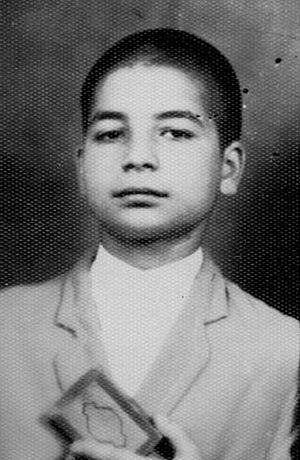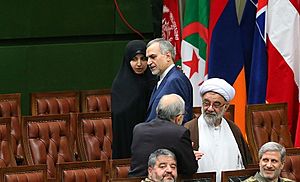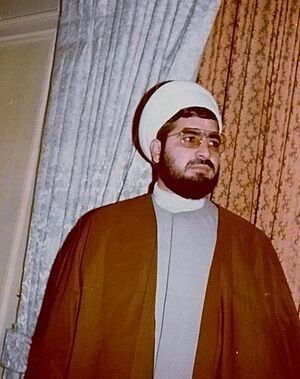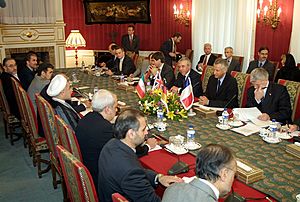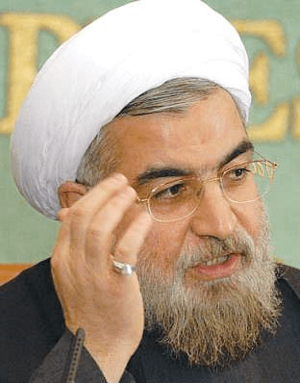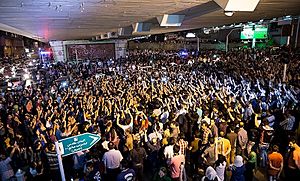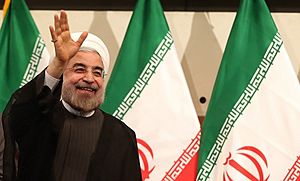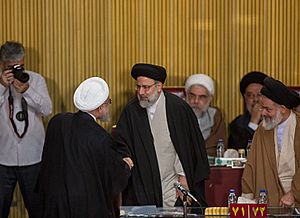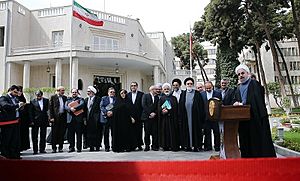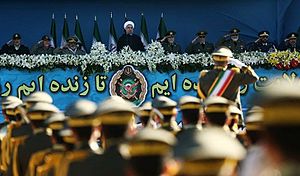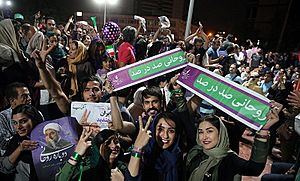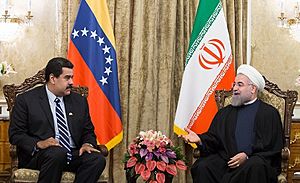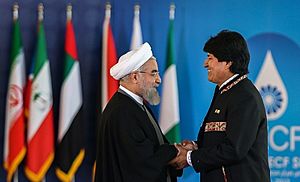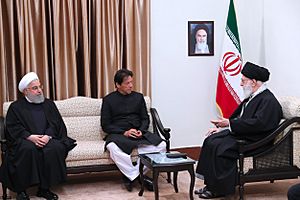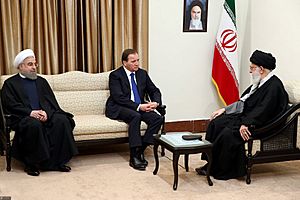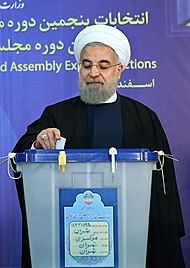Hassan Rouhani facts for kids
Quick facts for kids
Hujjat al-Islam
Hassan Rouhani
|
|
|---|---|
|
حسن روحانی
|
|
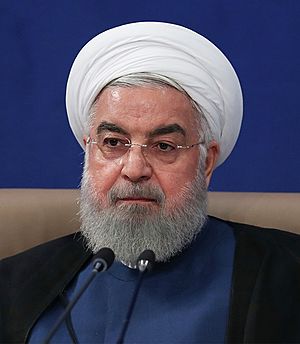
Rouhani in 2020
|
|
| 7th President of Iran | |
| In office 3 August 2013 – 3 August 2021 |
|
| Supreme Leader | Ali Khamenei |
| Vice President | Eshaq Jahangiri |
| Preceded by | Mahmoud Ahmadinejad |
| Succeeded by | Ebrahim Raisi |
| Secretary General of the Non-Aligned Movement | |
| In office 3 August 2013 – 17 September 2016 |
|
| Preceded by | Mahmoud Ahmadinejad |
| Succeeded by | Nicolás Maduro |
| Chief Nuclear Negotiator of Iran | |
| In office 6 October 2003 – 15 August 2005 |
|
| President | Mohammad Khatami |
| Deputy | Hossein Mousavian |
| Preceded by | Position established |
| Succeeded by | Ali Larijani |
| Secretary of the Supreme National Security Council | |
| In office 14 October 1989 – 15 August 2005 |
|
| President | Akbar Hashemi Rafsanjani Mohammad Khatami |
| Preceded by | Position established |
| Succeeded by | Ali Larijani |
| Member of the Assembly of Experts | |
| In office 19 February 2007 – 20 May 2024 |
|
| Constituency | Tehran Province |
| Majority | 2,238,166 (53.56%) |
| In office 18 February 2000 – 19 February 2007 |
|
| Constituency | Semnan Province |
| First Deputy Speaker of the Parliament | |
| In office 2 June 1992 – 26 May 2000 |
|
| Preceded by | Hossein Hashemian |
| Succeeded by | Behzad Nabavi |
| Member of the Islamic Consultative Assembly | |
| In office 28 May 1984 – 27 May 2000 |
|
| Constituency | Tehran, Rey, Shemiranat and Eslamshahr |
| Majority | 729,965 (58.3%; 2nd term) |
| In office 28 May 1980 – 27 May 1984 |
|
| Constituency | Semnan |
| Majority | 19,017 (62.1%) |
| Advisor to the President of Iran President of Center for Strategic Research |
|
| In office 5 August 1992 – 10 June 1997 |
|
| President | Akbar Hashemi Rafsanjani |
| Preceded by | Mohammad Mousavi Khoeiniha |
| Succeeded by | Position abolished |
| Member of Expediency Discernment Council | |
| In office 8 May 1991 – 3 August 2013 |
|
| Appointed by | Ali Khamenei |
| Chairman | Akbar Hashemi Rafsanjani |
| Succeeded by | Mahmoud Ahmadinejad |
| National Security Advisor to the President of Iran | |
| In office 2000–2005 |
|
| President | Mohammad Khatami |
| Preceded by | Khosrow Tehrani |
| In office 1989–1997 |
|
| President | Akbar Hashemi Rafsanjani |
| Personal details | |
| Born |
Hassan Fereydoun
12 November 1948 Sorkheh, Semnan Province, Imperial State of Iran |
| Political party | Moderation and Development Party (1999–present) |
| Other political affiliations |
Combatant Clergy Association (1988–present; inactive since 2009) Islamic Republican Party (1979–87) |
| Spouse |
Sahebeh Arabi
(m. 1968) |
| Children | 5 |
| Alma mater | Qom Seminary University of Tehran Glasgow Caledonian University |
| Signature |  |
| Website | Personal website (Persian) |
| Military service | |
| Allegiance | |
| Years of service | 1971–72 (conscription) 1985–91 |
| Unit | Sepah Danesh of Nishapur (1971–72) |
| Commands | Commander-in-Chief of Air Defense (1985–91) Deputy to Second-in-Command of Iran's Joint Chiefs of Staff (1988–89) |
| Battles/wars | Iran–Iraq War |
| Awards | |
Hassan Rouhani (born Hassan Fereydoun, 12 November 1948) is an Iranian politician. He served as the seventh president of Iran from 2013 to 2021. He is also a lawyer, academic, former diplomat, and an Islamic cleric.
Rouhani was a member of Iran's Assembly of Experts from 1999 to 2024. He was also part of the Expediency Discernment Council from 1991 to 2013. From 1989 to 2021, he was a member of the Supreme National Security Council.
He was a deputy speaker of the Iranian Parliament (Majlis) for two terms. He also served as Secretary of the Supreme National Security Council from 1989 to 2005. In this role, he was Iran's main negotiator with European countries on nuclear technology.
On 7 May 2013, Rouhani signed up for the 2013 Iranian presidential election. He promised to improve the economy and relations with Western countries. He also wanted to create a "civil rights charter." He won the election on 15 June 2013 and became president on 3 August 2013. Time magazine named him one of the 100 Most Influential People in the World in 2013.
Rouhani is often seen as a moderate politician. He supports personal freedom and access to information. He also appointed women to important government roles. He worked to improve Iran's diplomatic ties with other nations. He was re-elected in the 2017 election with a large number of votes. He was the third Iranian President to win re-election with more votes than his first term.
After his second term, Rouhani was not given any senior roles by the Supreme Leader Ali Khamenei. Their relationship became difficult, especially because Khamenei felt Rouhani was too soft in nuclear talks with Western countries.
Contents
Early Life and Education
Hassan Rouhani was born Hassan Fereydoun on 12 November 1948. He was born in Sorkheh, near Semnan, Iran. His family was religious. His father, Haj Asadollah Fereydoun, had a spice shop. His father was politically active against the Shah of Iran, Mohammad Reza Shah Pahlavi. He was arrested many times before the Iranian Revolution in 1979.
Rouhani began religious studies in 1960 at Semnan Seminary. He then moved to the Qom Seminary in 1961. He studied with important religious scholars. He also studied modern subjects. In 1969, he was accepted into the University of Tehran. He earned a degree in Judicial Law in 1972. In 1973, Rouhani joined the military in Nishapur.
He continued his studies at Glasgow Caledonian University in Scotland. He earned a Master's degree in Law in 1995. His thesis was about Islamic law in Iran. He then earned a PhD in Constitutional Law in 1999. His PhD thesis was about the flexibility of Islamic law in Iran.
There was some confusion about which university he attended. This was because his birth name, "Hassan Fereydoun," was used during his student years. Glasgow Caledonian University confirmed he was their graduate. They published his thesis summaries and a video of his graduation ceremony.
Personal Life
Rouhani married his cousin, Sahebeh Erabi, when he was about 20 years old. They have four children: one son and three daughters. His wife changed her last name to "Rouhani" after they married. She was born in 1954 and is not involved in politics.
Rouhani has three sisters and a brother. His brother, Hossein Fereydoun, is also a diplomat and politician. He has been a governor, ambassador, and former Vice Minister of Intelligence.
Political Activities Before the Iranian Revolution
Hassan Rouhani started his political activities as a young cleric. He followed Ayatollah Ruhollah Khomeini during the start of the Iranian Islamist movement. In 1965, he began traveling across Iran. He gave speeches against the government of Mohammad Reza Pahlavi, the Shah of Iran. He was arrested many times during these years. He was also banned from giving public speeches.
In November 1977, Rouhani used the title "Imam" for Ayatollah Khomeini for the first time in public. Khomeini was the exiled leader of the Islamist movement at that time.
Because he was watched by SAVAK (Iran's intelligence agency before the revolution), he was advised to leave the country. He then gave speeches to Iranian students abroad. He joined Khomeini when Khomeini arrived in France.
Political Career During the 1980s and 1990s
Early Years of the Islamic Republic
After the Iranian Revolution in 1979, Rouhani worked to make the new Islamic Republic stable. He helped organize the Iranian army and military bases. He was elected to the Majlis (Parliament of Iran) in 1980.
He served in the Majlis for 20 years, from 1980 to 2000. He was a deputy speaker of the Majlis for two terms. He also led the defense committee and the foreign policy committee.
From 1980 to 1983, he led the supervisory council of the Islamic Republic of Iran Broadcasting (IRIB).
Iran–Iraq War
During the Iran–Iraq War, Rouhani held many important roles. He was a member of the Supreme Defense Council from 1982 to 1988. He was also a deputy commander of the war from 1983 to 1985. He commanded the Iran Air Defense Force from 1986 to 1991. He was also Deputy to the Second-in-Command of Iran's Joint Chiefs of Staff from 1988 to 1989.
After the war, Hassan Rouhani received the second-grade Fath (Victory) Medal. He also received the first-grade Nasr Medal from Ayatollah Khamenei. These awards were for his service during the war.
After the War
Rouhani was offered the job of Minister of Intelligence of Iran in 1989, but he turned it down.
After the Iranian Constitution was changed, the Supreme National Security Council (SNSC) was created. Rouhani became the Supreme Leader's representative at the council. He was the first secretary of the SNSC for 16 years, from 1989 to 2005. He was also a national security advisor to Presidents Hashemi and Khatami. In 1991, Rouhani was appointed to the Expediency Discernment Council. He leads the Political, Defense, and Security Committee of this council.
In 2000, Rouhani was elected to the Assembly of Experts from Semnan Province. He was re-elected in 2006 as Tehran Province's representative. He served as the head of the political and social committee of the Assembly of Experts.
Rouhani also continued his academic work. From 1995 to 1999, he was on the board of trustees for Tehran Universities. He has been running the Center for Strategic Research since 1991. He is also an editor for several academic journals.
Nuclear Discussions
Rouhani was the secretary of the Supreme National Security Council (SNSC) for 16 years. He became known as the "Diplomat Sheikh" because of his role in nuclear negotiations. This nickname was given to him by a newspaper in 2003. His work at the council started under President Hashemi Rafsanjani and continued under President Khatami.
His time as Iran's chief nuclear negotiator lasted for 678 days, from October 2003 to August 2005. This period began when Iran's nuclear energy program became known internationally. The International Atomic Energy Agency (IAEA) passed a strong resolution. In June 2004, the IAEA board issued a statement, followed by a resolution in September. These aimed to put strict rules on Iran. This was happening while the United States was winning the Iraq war, and there was a lot of talk about war in the region.
To handle the rising tensions, a new nuclear team was formed. Hassan Rouhani was put in charge of this team on 6 October 2003. This decision was made by President Khatami and confirmed by Ali Khamenei. The team was given special powers to plan Iran's interactions with the IAEA. Negotiations between Iran and three European states began in Tehran. They continued in Brussels, Geneva, and Paris.
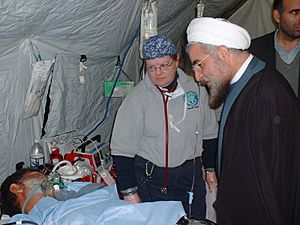
Rouhani and his team focused on talking and building trust. They worked to prevent more accusations against Iran. They wanted to stop Iran's nuclear case from being sent to the United Nations Security Council. To build trust, Iran voluntarily stopped some of its nuclear activities at different times.
Besides building trust and reducing international pressure, Iran also worked on its nuclear fuel cycle. However, some people later criticized the decisions made by Rouhani's nuclear team.
After Mahmoud Ahmadinejad became president, Rouhani resigned from his post as secretary of the Supreme National Security Council in August 2005. Ali Larijani took over his role and the nuclear case. Rouhani was then appointed by the Supreme Leader as his representative at the SNSC.
Presidential Campaigns
2013 Presidential Election
Rouhani was seen as a top candidate in the June 2013 election. This was because of his moderate views and his connections to Iran's religious leaders. He announced his plan to run for president on 11 March 2013. He officially registered as a candidate on 7 May.
Before the election, former presidents Mohammad Khatami and Akbar Hashemi Rafsanjani supported Rouhani. Other reformist politicians also backed him. On 15 June 2013, the election results were announced. Rouhani won with 18,613,329 votes. His main opponent, Mohammad Bagher Ghalibaf, received 6,077,292 votes.
Rouhani was popular with both the middle class and young people. He even won support in religious cities like Mashhad and Qom. His victory was seen as a result of the Iranian Green Movement from the 2009 elections. Many people celebrated his win, showing that they wanted changes from conservative policies.
2017 Presidential Election
Rouhani faced a strong challenge from Ebrahim Raisi in the 2017 election. Raisi was a hardline cleric who focused on economic problems. He criticized Rouhani for seeking foreign investment and appealed to religious conservatives.
Rouhani won the election by a large margin. This showed strong support for his efforts to improve relations with other countries and offer more freedoms. He received 23,636,652 votes. The election had a 73.07% voter turnout.
Presidency (2013–2021)
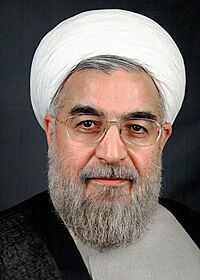 |
|
|
Presidency of Hassan Rouhani
|
|
|---|---|
| August 3, 2013 – August 3, 2021 | |
| Mohammad Reza Rahimi (until August 5 2013) Eshaq Jahangiri (from August 5 2013) | |
| Cabinet | see first and second |
| Party | Reformist (Moderation and Development) |
| Election |
|
| Seat | Pasteur St. Building |
|
← Mahmoud Ahmadinejad • Ebrahim Raisi →
|
|
After winning the election, Rouhani promised to improve Iran's relations with the world. He spoke about being more open and restoring Iran's international standing. He offered more transparency on nuclear issues to rebuild trust. In May 2017, Rouhani was re-elected as president.
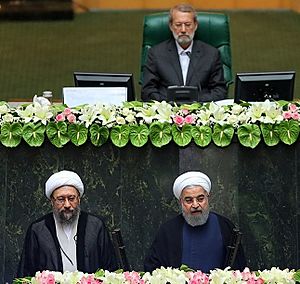
He officially became the seventh president of Iran on 3 August 2013. He was inaugurated in the House of the Parliament on 4 August.
Cabinet
Rouhani announced his cabinet members on 4 August. He appointed Eshaq Jahangiri as his first vice president. Other key appointments included Mohammad Javad Zarif as foreign minister and Abdolreza Rahmani Fazli as interior minister. He also appointed Mohammad Nahavandian as his chief of staff.
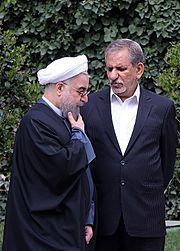
Domestic Policy
Economy
Hassan Rouhani's economic policy focused on Iran's long-term economic growth. He aimed to increase people's buying power and reduce the gap between rich and poor. He believed that creating national wealth would help everyone. His plan included giving more help to low-income families.
Rouhani also wanted to bring back the Management and Planning Organization of Iran. His economic plans included managing government support, controlling inflation, and speeding up economic growth. He believed that inflation harms families and wanted to reduce it.
Culture and Media
Since Rouhani became president in 2013, internet censorship has continued. However, it is clear that Rouhani does not have full control over this process.
He has said that "Gone are the days when a wall could be built around the country. Today there are no more walls." He also criticized the national broadcasting service for showing unimportant foreign news while ignoring important national issues. Rouhani supported increasing Internet access and other freedoms. He stated that people should be free in their private lives and have access to information.
Human and Women's Rights
Rouhani has generally avoided publicly discussing human rights issues. This is because he may have limited power in this area.
Rouhani supports women's rights. He said that men and women should have equal opportunities. He believes there is no difference between them in their humanity, intelligence, or service to God and people.
His government appointed several women as vice presidents. These included Elham Aminzadeh, Shahindokht Molaverdi, and Masoumeh Ebtekar. He also appointed Marzieh Afkham as the first female spokesperson for the foreign ministry. Rouhani had promised to create a ministry for women.
In September 2013, eleven political prisoners were released. This included human rights lawyer Nasrin Sotoudeh. This happened just before his visit to the United States.
In 2015, Rouhani appointed Marzieh Afkham as the first female ambassador since 1979. He also appointed Saleh Adibi as the first Sunni Kurd ambassador.
Foreign Policy
Rouhani's foreign policy was influenced by conservative groups in Iran. These groups were cautious about change, even though they knew it was needed. Rouhani's main goal was to improve talks between Iran and other major world powers. This was to help lift sanctions that had hurt Iran's economy.
In March 2015, Rouhani sent a letter to President Obama and the leaders of other countries involved in talks with Iran. He explained Iran's position. He also spoke by phone with leaders of all the negotiating nations, except the United States.
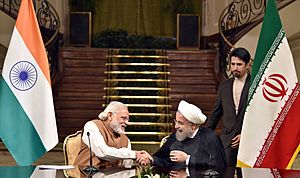
Nuclear Talks
Rouhani's government played a key role in the Joint Comprehensive Plan of Action (JCPOA). This was an agreement about Iran's nuclear program.
United Kingdom
Rouhani met with British Prime Minister David Cameron. This was the first meeting between leaders of Iran and the United Kingdom since the 1979 Islamic revolution. In February 2014, the Iranian Embassy in London was reopened. The two countries agreed to restart diplomatic relations. The embassy was officially reopened in August 2015.
United States
Rouhani's visit to New York City in September 2013 was seen as a big step in Iran's relations with the United States. He had said his government was ready for talks with the U.S. after 32 years. On 27 September 2013, Rouhani had a phone call with President Obama. This was the highest-level political exchange between the two countries since 1979.
In February 2019, Rouhani criticized the United States for trying to remove Venezuelan President Nicolás Maduro.
On 3 January 2020, Qasem Soleimani, a powerful figure in Iran, was killed by the United States. This greatly increased tensions between the two countries. Rouhani stated that Iran would "take revenge."
After Joe Biden won the U.S. presidential election in November 2020, Hassan Rouhani said it was a chance for Biden's government to "make up for previous mistakes."
Syria
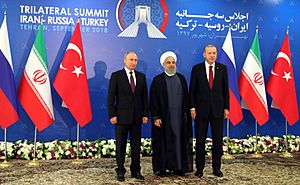
It is generally believed that Rouhani supported Bashar al-Assad, Syria's president, in the Syrian Civil War. In his first press conference after winning the election, Rouhani said that the Syrian people should decide how to resolve the civil war.
Iraq
Rouhani called Iran–Iraq relations "brotherly." He signed several agreements with Iraq. After the Northern Iraq offensive in June 2014, Iran was the first country to send help to Iraq. Iran is seen as a key player in the fight against ISIL.
Saudi Arabia
On Iran's relationship with Saudi Arabia, Rouhani wrote that during the Khatami government, he reached a "comprehensive and strategic agreement" with the Saudis. However, this agreement was not continued during the Ahmadinejad government.
Rouhani criticized the Saudi Arabian-led military actions in Yemen. He said: "Don't bomb children, elderly men and women in Yemen. Attacking the oppressed will bring disgrace."
Israel
Rouhani has described Israel as "an occupier and usurper government." He said it "does injustice to the people of the region, and has brought instability to the region, with its warmongering policies." He also called it a "cancerous tumor established by Western countries to advance their interests in the Middle East."
When asked about the Holocaust, Rouhani said that "any crime that happens in history against humanity, including the crime the Nazis created towards the Jews as well as non-Jews is reprehensible and condemnable."
Rouhani called the peace agreement between Israel and the United Arab Emirates a "huge mistake." He warned the UAE against allowing Israel to have a strong presence in the Persian Gulf.
Public Image and Perception
According to a poll in March 2016, Rouhani had a 75% approval rating. This made him the second most popular politician in Iran, after Mohammad Javad Zarif.
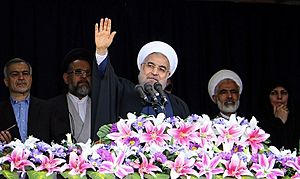
Job Approval
Rouhani started his presidency in November 2013 with about 58% approval. His approval rating dropped to 48% by May 2015. His job approval increased after the Joint Comprehensive Plan of Action (nuclear deal). A survey in August 2015 showed his approval at 88%. Many people had high hopes for economic improvements from the deal. By February 2016, his approval reached 67%, his highest level since taking office.
Post-Presidency
On 24 January 2024, Rouhani said that he was not included in the list of candidates for the Assembly of Experts elections in March 2024. He criticized this decision.
In 2024, Rouhani criticized the return of Iran's morality police. He also spoke against the "Noor plan" by law enforcement. He was surprised by the hijab law approved by the Guardian Council. He said it did not fit with the Constitution, justice, or Islamic culture.
Political Positions
Rouhani is seen as a moderate and practical politician. In 2000, he was described as "power-hungry." He won the presidency with strong support from reformists. He promised to meet their demands and bridge differences between reformists and conservatives.
During his 2017 re-election campaign, Rouhani's views moved more towards the left. He fully aligned with the reformist group.
Electoral History
| Year | Election | Votes | % | Rank | Notes |
|---|---|---|---|---|---|
| 1980 | Parliament | 19,017 | 62.1 | 1st | Won |
| 1984 | Parliament | 729,965 | 58.3 | 17th | Won |
| 1988 | Parliament | Won | |||
| 1992 | Parliament | Won | |||
| 1996 | Parliament | Won | |||
| 2000 | Parliament | 40th | Lost | ||
| Assembly of Experts mid-term | 120,819 | 47.56 | 1st | Won | |
| 2006 | Assembly of Experts | 844,190 | 7th | Won | |
| 2013 | President | 18,613,329 | 50.88 | 1st | Won |
| 2016 | Assembly of Experts | 3rd | Won | ||
| 2017 | President | 1st | Won |
Images for kids
See also
 In Spanish: Hasán Rohaní para niños
In Spanish: Hasán Rohaní para niños
 | William M. Jackson |
 | Juan E. Gilbert |
 | Neil deGrasse Tyson |


